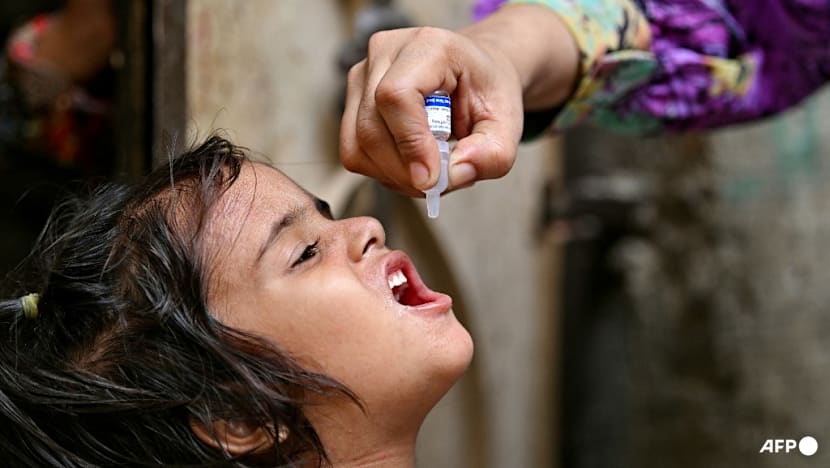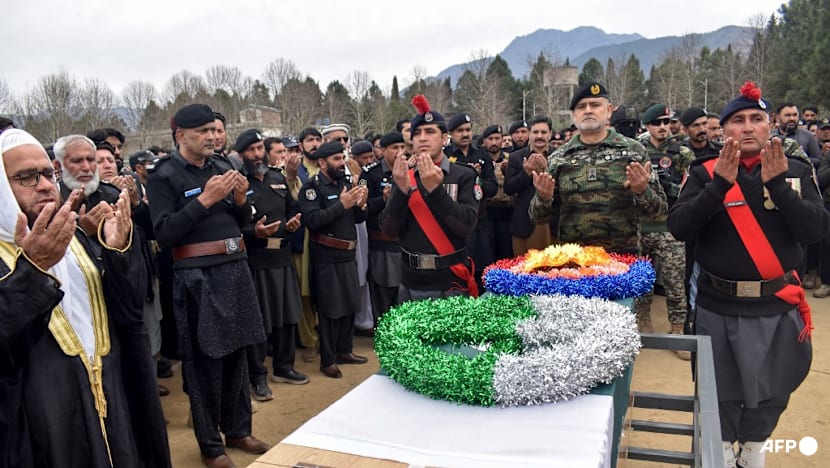Pakistan steps up polio vaccination campaign amid security and misinformation hurdles
Despite years of eradication efforts, Pakistan remains one of two countries in the world where polio remains endemic.

A health worker administers polio vaccine drops to a child during a vaccination campaign in Karachi on May 26, 2025. (Photo: AFP/Asif Hassan)

This audio is generated by an AI tool.
ISLAMABAD: Pakistan is stepping up efforts to vaccinate tens of millions of children against polio, but security challenges and deep-rooted vaccine misconceptions remain major hurdles, health experts say.
In a weeklong campaign which began on Oct 13, the country set out to immunise 45 million children under the age of five against the virus.
More than 400,000 frontline health workers were deployed across 159 districts, in places such as schools and homes to administer the vaccine – two drops into each child’s mouth – and educate communities.
Despite years of vaccination drives, Pakistan is one of only two countries, along with Afghanistan, where the disease remains endemic.
Polio mainly strikes young children but can infect adults as well. It can lead to paralysis or, in severe cases, death.
The virus spreads easily through contaminated water, poor sanitation, or respiratory droplets from an infected person.
This year, Pakistan has logged 29 polio cases as of September, and experts say this is a high number for a disease that has largely been eradicated around the world.
“One case is alarming. We have 29, and we are the only region – Pakistan and Afghanistan – having those wild poliovirus cases. We have to be worried about this,” Mumtaz Ali Khan, chief of the Centre for Disease Control at Pakistan’s National Institutes of Health, told CNA.
Unvaccinated children can put entire communities at risk. They excrete the virus in their stool, which can contaminate drinking water and sewage, Mumtaz added.
The latest drive is the country’s fifth this year as it reaches out to children who missed earlier rounds and to ensure no child remains unprotected.
However, most cases show no symptoms, meaning they often go unnoticed, unrecorded and untreated, experts say. That makes it difficult to track and control, allowing the virus to transmit and infect with little resistance.

SECURITY CHALLENGES AND MISCONCEPTIONS
The province of Khyber Pakhtunkhwa in Pakistan’s northwest recorded 18 cases this year, accounting for more than half the cases in the country. Officials attribute this to a combination of security challenges and vaccine resistance.
Hardline clerics and militants have long opposed vaccination, falsely claiming it is a Western conspiracy to sterilise Muslims – a myth that persists in some areas.
Over the past decade, militants have killed hundreds of police officers and health workers as part of a campaign against the Pakistani state.
Last week, two police officers guarding polio vaccination workers in northwest Pakistan were killed, AFP reported.
Experts say the country’s strategy has to cover both vaccination and education.
"We try to vaccinate them through refusal conversion committees and influencers,” said Israr ul Haq, spokesperson for the polio eradication programme at Pakistan’s National Emergency Operations Centre.
Awareness campaigns are slowly changing minds.
Madiha Laique, a parent in Khyber Pakhtunkhwa, is among community advocates helping to shift her neighbours’ attitudes.
“I tell people in the neighbourhood that we’ve been getting our children vaccinated from the start, because many from Khyber Pakhtunkhwa still don’t believe in polio vaccines,” she said.














